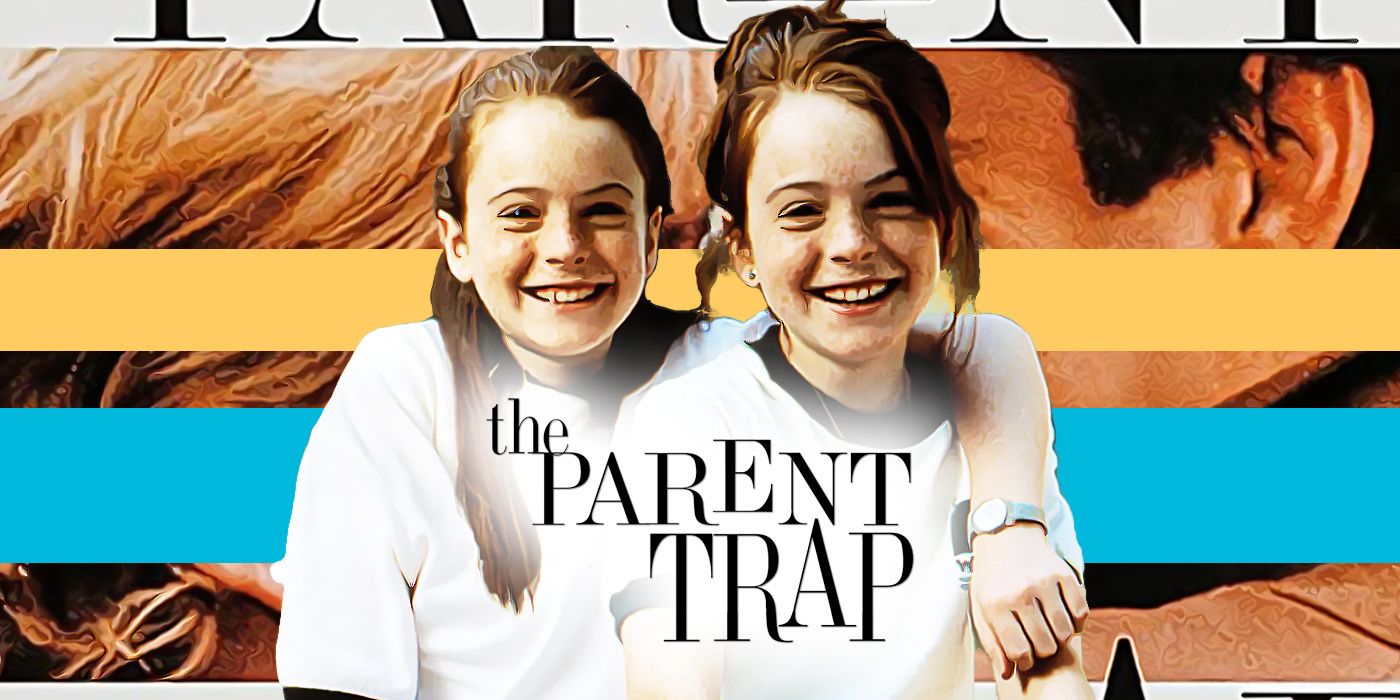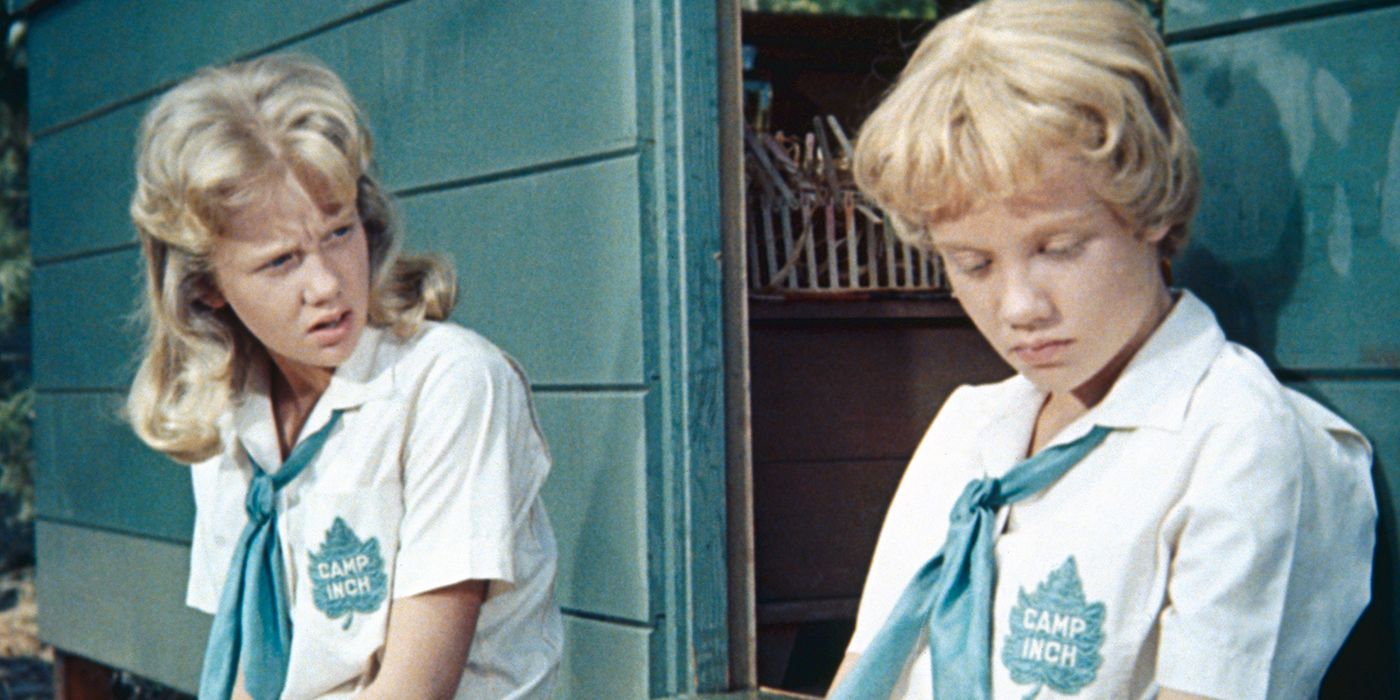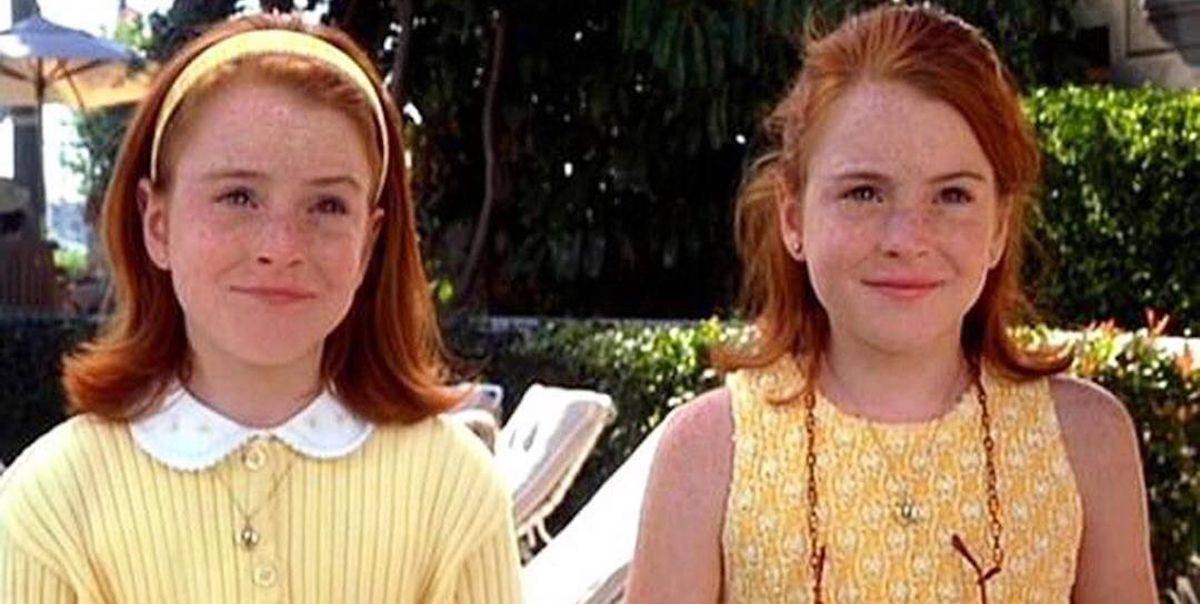If there’s one thing Hollywood loves, it’s a remake. From reimagined films like Hustle and A Star Is Born, to rebooted television series like Will & Grace to And Just Like That…, updating existing intellectual property to suit a modern audience generally seems to be a hit or miss endeavor. What actually makes a good remake? Answering that question is best done through a deep dive into one of the most successful remakes championed in 1998 by writer/director Nancy Meyers: The Parent Trap.
The original 1961 The Parent Trap, directed by David Swift and starring Hayley Mills as twins Susan Evers and Sharon McKendrick, tells the tale of a set of estranged twins who have been raised apart from one another, each by one of their parents, who meet at a summer camp and devise a plan to reunite their divorced parents. In the 1998 version, Lindsay Lohan takes up the mantle of playing twins Annie James and Hallie Parker in an impressive debut performance. When casting for the twins, Nancy Meyers has said she was looking for a young Diane Keaton-like actress, and Lohan absolutely delivers. Along with exceptional casting choices like the late Natasha Richardson, Dennis Quaid, Elaine Hendrix, Lisa Ann Walter, and Simon Kunz, this remake is a triumph because of how it evolves upon the character development within its original source material without completely disregarding the parts of the original that make it worth a reboot in the first place.
The premise of both Parent Trap films is hard to swallow. Two parents so incredibly perturbed by one another that they’d effectively abandon one of their own children is a wild notion. A premise this unlikely requires strong justification through grounded character development. In the original, the justification doesn’t go much deeper than surface level. Pretty much all we're given is that parents Maggie McKendrick (Maureen O’Hara) and Mitch Evers (Brian Keith) can’t stand each other to such an extent that this arrangement of separating their daughters is their only option. Meyers’ 1998 version, though, adds another layer to this puzzle. In Meyers’ version, Hallie Parker and Annie James’ mother Elizabeth James (Richardson) has always dreamed of being a wedding dress designer. While the movie continues on with the same underlying justification that Elizabeth and the twins’ father Nick Parker (Quaid) hate each other so much that they devise this horrid arrangement, giving Elizabeth a career seemingly incompatible with Nick’s career, as the owner of a Napa Valley vineyard. While nothing could make this premise feel totally empathetic, both of these parents being equally ambitious feels like a stronger step forward for this narrative.
In the original Parent Trap, twins Susan and Sharon meet at camp and immediately dislike one another solely because Susan hates that Sharon has her face, and Sharon hates how cruelly Susan treats her. Susan and Sharon's grievances with one another are written as catty and superficial. This surface-level interaction, the tension between two girls stemming from such shallow roots, unfortunately, feels very of the decade it was made. It's no surprise that when Meyers embarked on updating this classic for a '90s audience she set her sights on deepening the initial character and relationship development here between the central twins.
Meyers evolves this old trope by giving her updated twins a more grounded first interaction. The twins engage in a delightfully choreographed fencing match, masked, so they have no idea they’re each fighting someone sporting their face. Annie accidentally pushes Hallie into a trough of water, and Hallie pulls Annie in as retaliation. This initiates their animosity toward one another through actions they’ve each made unrelated to how they feel about their shared looks. Hallie and Annie continue antagonizing one another during a poker game where their similarities are on full display. We also get to see sisterly teasing develop between the girls. Meyers spends much more time within the camp setting her script than we get to spend in the original film. By taking her time developing the relationship between these two sisters, Meyers fills in the depth missing within this original relationship. A good remake does exactly this — not only updating the original with comparable present-day details, but also evolving the characters further than they were originally taken. Other than looking similar and both being versed in pranks, the original twins didn’t really have much in common. In the remake, they both fence, and they’re both great at poker, two more obscure hobbies that actually make a lot of sense for two only children raised by single parents, more likely to have spent increased time growing up around adult company.
What some remakes, like with Disney’s The Lion King, get wrong is that they go for a shot-for-shot approach, effectively restaging a classic with new cinematography. These remakes fall flat because they add nothing new to the original premise. In Meyers’ Parent Trap, she avoids going down this track in a multitude of ways, the most robust of which being that she introduces a parallel love story running alongside that of Nick and Elizabeth. Where the original Parent Trap gets bogged down by all the incessant fighting between estranged parents Maggie and Mitch, once both families meet up at the Stafford Hotel in the remake, Nick’s housekeeper Chessie (Walter) and Elizabeth’s butler Martin (Kunz) fall for each other. This B-Story adds much needed romantic and comic relief, balancing the fighting between Nick and Elizabeth with moments of much-needed levity. Finding ways to add more nuanced dynamics and dimensions to existing classics is an effective way successful remakes embrace their original source material while also leveling up the story structure complexity for modern audiences.
Adding further complexities into this remake, Meyers introduces more locations into her version. Instead of hosting the majority of the reconnection scenes at Nick’s home in Napa, Meyers ups the stakes, placing both families on a holiday weekend at the fancy Stafford Hotel for their first meeting in eleven years. This added location allows for delicious little moments like Meredith (Hendrix) meeting Elizabeth in the bar and fawning over her before Meredith realizes Elizabeth is Nick’s ex. It’s these sorts of micro-turns within these relationships that makes the remake feel all the more elevated. Meyers also expands upon the parents’ original love story, setting their initial romance on the Queen Elizabeth 2, a boat Hallie and Annie can then rent for an epic date night trap. A big step up from the juvenile talent show Susan and Sharon put on for their parents — though their musical performance is certainly timeless. Adding these additional locations ups the stakes in a grounded way that ultimately treats the whole film less as a slapstick children’s movie and more as a legitimate comedy, relevant to both children and adults.
Amidst all of these compelling additions, what truly makes The Parent Trap remake a success is that it keeps the strongest parts of the original source material intact. Nick’s slapstick fall into the pool after he first spots Elizabeth, the one that got away? Classic. The camping trip the twins commandeer as their final opportunity to haze Meredith out of their lives for good? The Parent Trap wouldn’t be The Parent Trap without it. Meyers’ new version even finds a way to work song and dance elements into Annie’s handshake with Martin, and Hallie hums "Let’s Get Together," the famous song from the original as she wanders through the Stafford Hotel.
A good remake like this one gives fans what they crave from the original, and then some — yes, and-ing into an equal-parts familiar and decidedly better version. While there's plenty to enjoy about the original classic — a delightful stop-motion introduction, a deliciously clever performance by Maureen O'Hara, and that charming musical performance the twins treat their parents to during the reenactment of Mitch and Maggie's first date — this remake unequivocally improves the story. Meyers' additions grow this simple story up for a modern audience, catering to a taste for more complex narratives, while keeping that fun, quirky tone intact. This balance of adding what the story was missing without doing away with too much of what always worked is the secret sauce to a successful remake. All in all, this one really came together, yeah, yeah, yeah!



